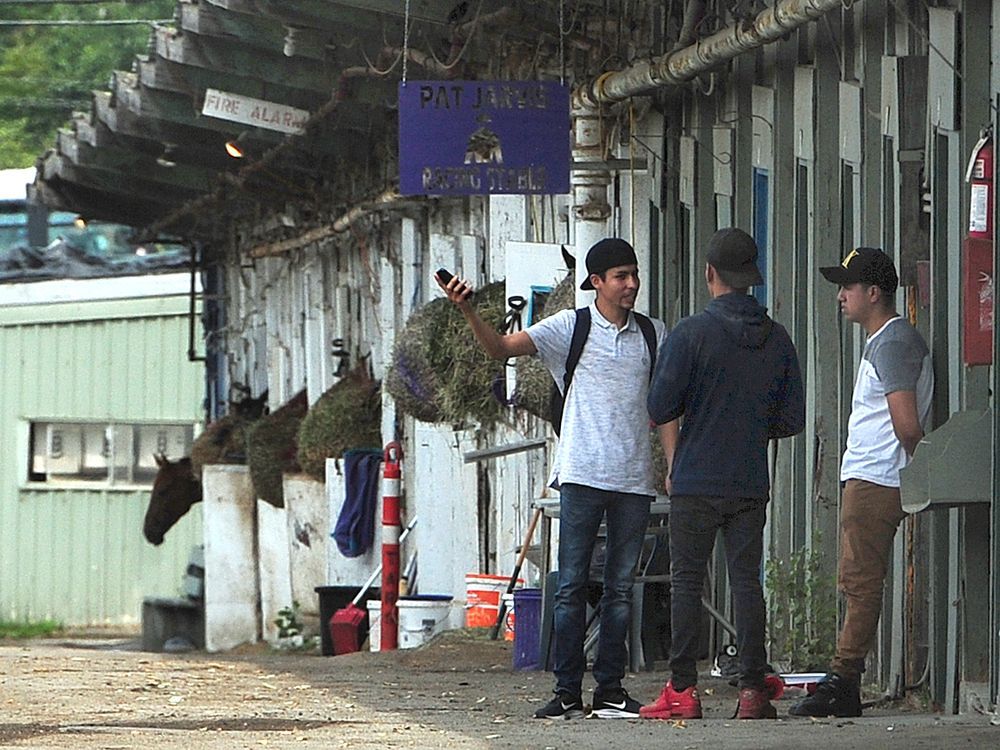Mass arrests at the track: 'It felt like we weren't in Canada for a moment'

Credit to Author: Gordon McIntyre| Date: Wed, 21 Aug 2019 03:08:30 +0000
A dawn raid and mass arrests by the Canada Border Services Agency at Hastings Racecourse are not unusual actions for border agents, a Vancouver immigration lawyer said.
Up to 26 backstretch workers were led away in restraints from the racetrack by CBSA officers on Monday.
“I’ve been trying to follow up on that and get gritty with the facts,” said lawyer Richard Kurland. “The view from 10,000 metres is simple: CBSA has engaged in group arrests across Canada over many years.
“Typically, CBSA will engage in group arrests to scoop failed refugee claimants, people who have outstanding arrest warrants, or illegal workers.”
The agency has usually done its homework, he said, and, as in the case at Hastings, knows who it is after.
Border agents had photos of who they were looking for and were “unnecessarily abrasive,” said David Milburn, a long-time horse owner and president of the Horsemen’s Benevolent and Protective Society.
The known facts are scant, he said, other than none of those detained are employees of Hastings Racecourse, its owner Great Canadian Gaming Corp., or of the benevolent society.
He believes all those detained were duly licensed by the provincial Gaming Policy and Enforcement Branch.
Other than that, it’s all speculation, said Milburn, a criminal lawyer.
“And we’re not getting answers,” he said. “Why is the federal government interested in coming down on Hastings Park when they’ve got so much to do trying to keep fentanyl from coming across the border so it doesn’t end up in fake oxy and killing people?
“They’ve got a lot better things to do, I think, than to rustle up some people who are on the jobsite brushing and grooming horses. That’s a big question and will undoubtedly be answered in the days to come, but right now it’s speculative to provide an answer to that question.”
He said the operation, carried out by border officers in coordination with provincial gaming officials, was well-planned and involved at least 20 officers in black.
“Not the (gaming branch) guys, but the immigration guys treated the targets very poorly and aggressively,” Milburn said. “Very aggressively, like they were arresting murderers and bank robbers and gang members.
“These were grooms who were cooperating. … It was like we weren’t in Canada for a moment. It was like we were in some other country that’s not as enlightened as our country.”
The next live racing is scheduled for Friday night at Hastings and won’t be affected, track spokesman Greg Douglas said. There are about 1,200 workers looking after the hundreds of horses at Hastings Racecourse, he added.
Under Canadian immigration law foreigners with specific track jobs in B.C. are exempt from the usual work-permit process if they have the proper credentials to be licensed, have a contract offer from a horse owner, and the term of employment is limited to the racing season.
“I can see how things can spin out of control,” Kurland said. “For example, for the taking care of horses and things like that, it’s allowed, but under very strict conditions and for very short durations.
“It’s possible to pop these guys across the border and say you’re only doing it for a short period, and then you just don’t leave. CBSA usually has its ducks in a row prior to executing group arrests, and that means CBSA is ready to roll on the removal (from Canada) process.
“Oftentimes, naturally, the person concerned is not ready.”
Border agents arrived at Hastings at 6:30 a.m. on Monday.
“The CBSA conducts enforcement actions when it is believed that a contravention of the Customs Act or the Immigration and Refugee Protection Act has occurred,” agency spokeswoman Candice Snider said. “As the investigation is ongoing, it would be inappropriate to provide any further details at this time.”
Bill McNeil, the director of racing at the B.C. Gaming Policy and Enforcement Branch, referred questions to the attorney-general’s office, which declined an interview request.
Regardless of whether rounded-up workers were licensed provincially, Kurland said, foreign workers must meet federal requirements.
“Permission to work in Canada has got to be granted pursuant to the immigration laws. That’s the key,” he said. “It’s nice to get a note from someone saying you’re authorized to work in his house, but that doesn’t cut it.”